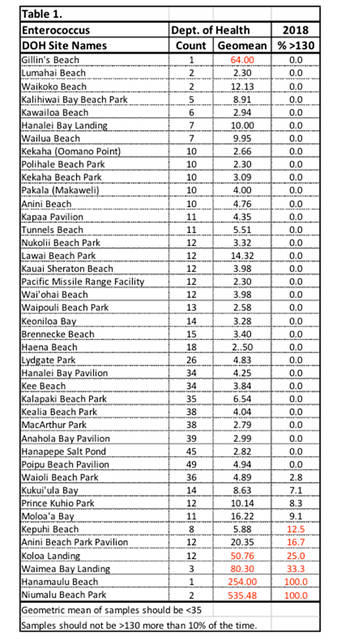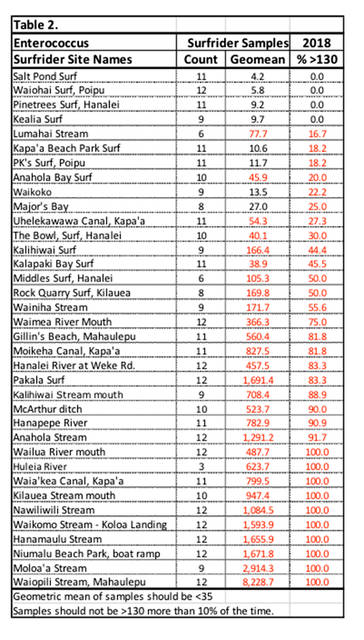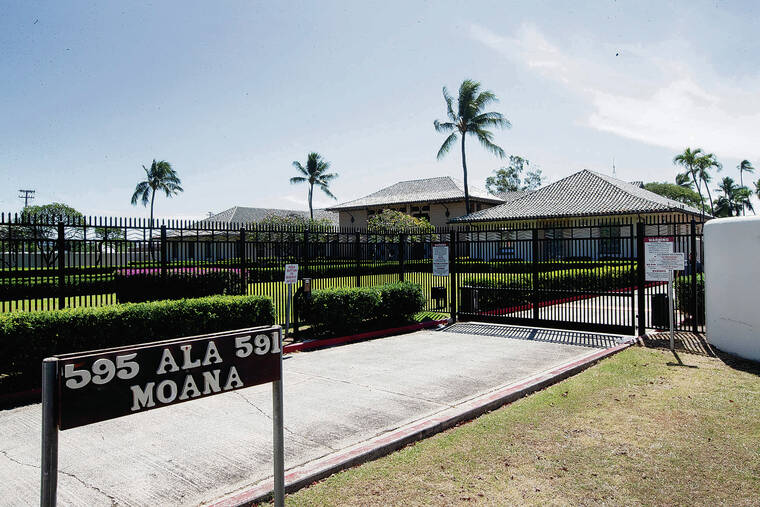Ocean and nearshore waters around Kauai are monitored on a regular basis by the Clean Water Branch of Hawaii’s Department of Health and by the Blue Water Task Force of the Kauai Chapter of the Surfrider Foundation. Both organizations collect samples in similar ways and do testing for enterococcus bacteria concentrations using the same method approved by U.S. Environmental Protection Agency.
The data are analyzed and summarized using water-quality criteria set by Hawaii Administrative Rules 11-54-8 to protect human health in coastal recreational waters. Specifically, for a 30-day period the enterococcus concentrations should not exceed a statistical threshold value (STV) of 130 bacteria per 100 ml more than 10 percent of the time or exceed a geometric mean of 35 bacteria per 100 ml for the same period. The same criteria were applied to all of the data collected on Kauai during 2018.
The DOH and Surfrider monitor different types of beaches and coastal recreational waters to provide needed water-quality information to inform safe beachgoing. DOH collects water samples at popular ocean beaches, and Surfrider collects at popular surfbreaks or in estuaries where canal, stream or river water meets the ocean at the beach. The latter sites are extremely popular places for children to play in the water.
In 2018 DOH sampled a total of 42 sites on Kauai, with 33 sites sampled eight or more times over the course of the year (Table 1). DOH sampled 10 priority beaches more than 25 times, as these beaches are ranked Tier 1 because of their high use. Of the 374 samples collected from Tier 1 beaches, only one test result showed high bacteria levels that exceeded the STV of 130. The water at these beaches is very clean.
Overall, 88 percent of the DOH sites met that geometric mean criteria of 35 bacteria and 86 percent met the 130 bacteria in less than 10 percent of the time criteria. Note that DOH samples most frequently where the water is usually clean and safe for swimming.
Sites of concern are indicated in red in Table 1. These are Koloa Landing, Waimea Bay Landing, Hanamaulu Beach Park and Niumalu Beach Park. Only the last two have chronic water-pollution caution signs posted on site.
Surfrider sampled a total of 36 sites, with 33 sites sampled eight or more times over the course of the year. A total of 367 samples were collected and analyzed. The waters at these sites monitored by Surfrider were often not clean.
Overall, only 22 percent of Surfrider’s sampling sites met the geometric mean health criteria of 35 bacteria, and all sites tested failed to meet the STV criteria of 130 bacteria. While surfbreaks are almost always clean, water in the canals, streams and rivers that discharge onto the beach are polluted with fecal-indicating bacteria from surface-water runoff and groundwater contamination from improperly maintained cesspools and septic systems.
While DOH chronic-water pollution warning signs have been posted at Gillin’s Beach (at Mahaulepu), Waiopili Stream, Hanamaulu Beach Park and Niumalu Beach Park, many more signs are needed to inform the public about the health risk from swimming in polluted waters and to warn them to stay out.
Surfrider is petitioning the DOH to post caution signs at those 10 sites where samples exceeded the STV healthy standard 100 percent of the time it was tested. Every time the water was sampled it was polluted, and this poses a great health risk, especially to children who are attracted to these warm, calm waters on the beach.
Surfrider water-quality data from 2018 shows another eight sites exceeded the STV more than 80 percent of the time, with geometric means greater than 450 bacteria/100 ml — almost 13 times the state health standard of 35. These sites are also badly polluted.
Working together, Surfrider and the DOH must identify polluted waters and make sure that residents and visitors alike are aware of potential health threats at the beach. The DOH can then identify the sources of pollution and take action to eliminate them. We need to ensure that the health of anyone enjoying the beach or our coastal waters here on Kauai is safe and protected.
•••
Dr. Carl J. Berg, Ph.D., is a senior scientist, Kauai Chapter of the Surfrider Foundation.






